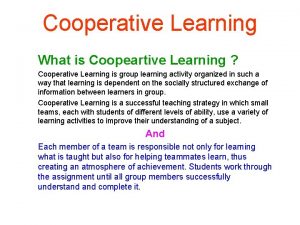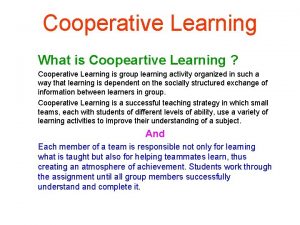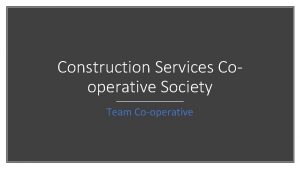Cooperative Learning Melanie Liddy Latia Vales Cathy Hennes







- Slides: 7

Cooperative Learning Melanie Liddy Latia Vales Cathy Hennes Ashwag Alshaif S

What is cooperative learning? S “Cooperative learning is an approach to organizing classroom activities into academic and social learning experiences. Students must work in groups to complete the two sets of tasks collectively. Everyone succeeds when the group succeeds. ”

Pros of cooperative learning in the classroom: S Student’s gains from each other are efforts. S Recognize that all group members play an important role. S Knows that the group is dependent upon the effort that is given. S Creates a since of pride within the student and the group for the ending accomplishment. S Promotes student learning and academic achievement. S Enhances the students learning experience. S Helps student s develop verbal and non-verbal skills. S Helps to develop students’ social skills. S Help to promote race relations and knowledge about different cultures.

Cons of cooperative learning in the classroom S Teammates do not do an equal share of the work that is due, often naming the individuals “Hitchhikers” S Teammates who do not do an equal share of the work can receive grades that they didn’t truly earn or can lower the overall team grade S Teams should not always meet together to complete assignments as teammates are functionally at different levels and may complete tasks quicker S Teammates come from different social circles and the team may not be able to functionally work together S Team members may be assigned tasks to complete the project required, but may not interact with each other to complete their

Where do we stand? SFor Cooperative Learning

Our thoughts: S As a group we are in favor of cooperative learning. It promotes students learning and academic achievement. Also, it increases student retention. This helps to build well -rounded learners through cooperative learning experiences. For many students it helps to enhance student satisfaction with their learning experience. It also helps students to develop skills in oral communication through group talk. Through developing social skills, it promotes student self-esteem. It also helps to promote racial tolerance through interaction with different students.

Reference: Kagan, S. (2001, October 15). Cooperative learning. Retrieved from http: //www. edtech. kennesaw. edu Kagan, S. (1999, December). Cooperative learning: Seventeen pros and seventeen cons plus ten tips for success. Retrieved from http: //www. kagononline. com Felder, R. M. , & Brent, R. (n. d. ). Cooperative learning. Retrieved from http: //www 4. ncsu. edu/unity/lockers/users/f/felder/public/ Papers/CLChapter. pdf Dahley, A. M. (1994, October 1). Cooperative learning classroom research. Retrieved from http: //alumni. media. mit. edu/~andyd/mindset/design/ clc_rsch. html Martin, M. (1992, June). Cooperative learning. Retrieved from http: //www 2. ed. gov/ pubs/OR/Consumer. Guides/cooplear. html













